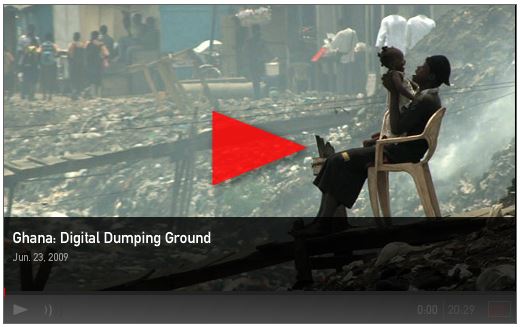We came across this powerful story as another reminder of why we should care about what happens to our old electronic equipment. Just outside of Ghana’s largest city is a toxic slum located on one of the planet’s most polluted bodies of water. Peter Klein took a group of graduate students to learn more about this place and to meet with Mike Anane, a local journalist who has been following the boys who work in the dump.
“I’m trying to get some ownership labels,” Anane tells reporters. “I’m collecting them because you need them as evidence. You need to tell the world where these things are coming from. You have to prove it. Now, just look,” he says, pointing to an old computer with the label: “School District of Philadelphia.”
Salvageable hard drives are sold on the street, and so Klein and his team purchased several. They found credit card numbers, personal photos, bank account information, and, on a hard drive that formerly belonged to Northrop Grumman, a $22 million government contract.
Even companies and agencies who try to responsibly recycle may unknowingly trust retired computers and phones to somebody who exports. Klein’s students brought some equipment to a facility in the U.S. and were told “What they literally do is dump it into a blast furnace and it burns it all up; and all they get out of it is a bunch of ash and some of the precious metal. Everything else gets consumed, burnt. And that’s an actual fact.”
The students recorded the container numbers and tracked them. Their equipment wasn’t burned but instead sent to Hong Kong where, like in Ghana, people melt the toxic plastic to retrieve the small amounts of precious metal found within circuit boards.
“…the free market will send it to the lowest common denominator, to the worst facilities where people are sitting on the streets just picking through it by hand,” he says. “It’s a myth to think that you can just solve the problem immediately with technology alone.”
(read the full article here)
Each year, hundreds of millions of laptops, mobile phones, hard drives and other electronics are discarded by corporations, government institutions and consumers. A mere 18% of these are likely to be properly disposed of, which means that an alarming amount of them end up in landfills. What can your organization do to ensure that your old IT equipment doesn’t end up in a landfill? For starters, ensure that the organization you’re trusting to recycle your equipment is either R2 or E-Stewards certified.
Securis is R2 certified which means that the IT electronics that we handle are stripped of sensitive data and then processed in an environmentally-friendly manner.
Being R2 certified means that:
- We do not export equipment or its components
- We’ve undergone a rigorous audit by an independent third party who evaluates more than 50 areas of performance
- We’re held accountable to effectively, securely destroy all data on our clients’ storage devices
- We send materials only to licensed and permitted R2 facilities

